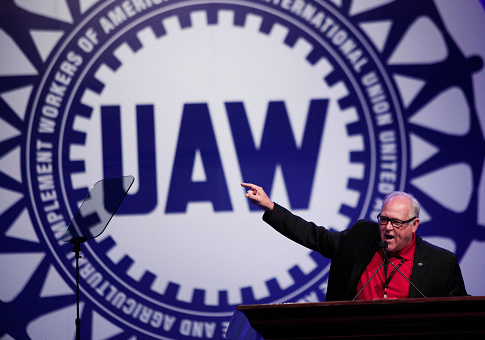A veteran autoworker has launched a new group to encourage reform at his former union.
Terry Bowman, a Ford line worker who spent decades as a dues-paying member of the United Auto Workers union, has long criticized the labor organization for its political activities. He is now attempting to take that criticism nationwide with the group Moving Unions Forward.
Bowman said the organization aims to move unions toward a direction focused on employees and membership, rather than the organization's influence.
"As a longtime union member, I understand the pitfalls of union representation better than most," Bowman said in a release. "The UAW's 20th-century organizing model has failed to gain traction with employees because they understand that the union’s agenda is often not their agenda."
The UAW has made steady gains in membership as the automotive industry recovered from the Great Recession, which saw GM, Chrysler, and their auto suppliers lay off thousands of workers. It represented about 416,000 workers in 2016, according to federal labor filings, up from 355,000 in 2009.
Despite those recent gains the UAW has still suffered dramatic losses in membership: it represented more than 700,000 autoworkers in 2002.
The union has launched ambitious campaigns to organize workers in right to work states, which have attracted substantial investment from foreign automakers. Those campaigns have failed. Workers at a Chattanooga, Tenn., Volkswagen plant and a Canton, Miss., Nissan factory voted against joining the union in 2014 and 2017, respectively.
Moving Unions Forward cofounder Vincent Vernuccio said those losses reflect workers' opposition to the traditional union model. The group is not just targeted at the UAW but all of organized labor. Vernuccio said workers are resistant to the winner-take-all model of organizing campaigns and are skeptical of being forced to pay dues for representation they may have opposed.
"A lot of these unions are stuck in the 20th century business model that is more about the union and less about the worker," Vernuccio said in an interview with the Washington Free Beacon. "The main problem they're having today is compulsion."
Union membership is at historic lows, according to the Bureau of Labor Statistics. The unionization rate has fallen by 50 percent over the past three decades with just 14.6 million workers, less than 11 percent of the total workforce, paying unions dues.
Unions lost 240,000 members in 2015 and those losses are expected to continue given the spread of right-to-work laws, which prohibit employers from requiring union membership as a condition of employment, in traditional labor strongholds, such as Wisconsin, Indiana, and Missouri. Bowman severed ties with the UAW after Michigan implemented right to work in 2013.
American labor law requires unions to represent all members of a bargaining unit once it has received majority support; dissenters in non-right-to-work states can forgo full dues, but are required to pay agency fees to cover representation costs while withholding funding for a union's political activities. Vernuccio wants to reform those laws to encourage an all-volunteer labor landscape. He said unions can reverse historic decline by appealing to workers' interests.
"We want unions to be professional service organization that workers want to join, that workers want to voluntarily pay for representation they actually want," he said. "Our target audience is unions. We are trying to get them to reform their ways and adopt a business model that has the workers' interest as paramount, rather than that of the union."
The UAW did not respond to request for comment.
